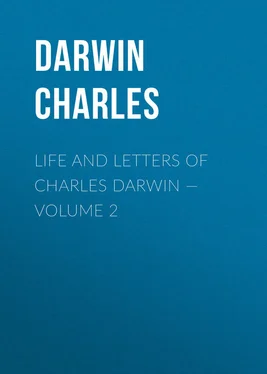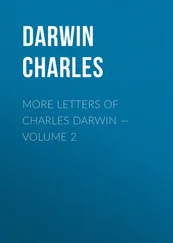Charles Darwin - Life and Letters of Charles Darwin — Volume 2
Здесь есть возможность читать онлайн «Charles Darwin - Life and Letters of Charles Darwin — Volume 2» — ознакомительный отрывок электронной книги совершенно бесплатно, а после прочтения отрывка купить полную версию. В некоторых случаях можно слушать аудио, скачать через торрент в формате fb2 и присутствует краткое содержание. Жанр: foreign_antique, foreign_prose, на английском языке. Описание произведения, (предисловие) а так же отзывы посетителей доступны на портале библиотеки ЛибКат.
- Название:Life and Letters of Charles Darwin — Volume 2
- Автор:
- Жанр:
- Год:неизвестен
- ISBN:нет данных
- Рейтинг книги:3 / 5. Голосов: 1
-
Избранное:Добавить в избранное
- Отзывы:
-
Ваша оценка:
- 60
- 1
- 2
- 3
- 4
- 5
Life and Letters of Charles Darwin — Volume 2: краткое содержание, описание и аннотация
Предлагаем к чтению аннотацию, описание, краткое содержание или предисловие (зависит от того, что написал сам автор книги «Life and Letters of Charles Darwin — Volume 2»). Если вы не нашли необходимую информацию о книге — напишите в комментариях, мы постараемся отыскать её.
Life and Letters of Charles Darwin — Volume 2 — читать онлайн ознакомительный отрывок
Ниже представлен текст книги, разбитый по страницам. Система сохранения места последней прочитанной страницы, позволяет с удобством читать онлайн бесплатно книгу «Life and Letters of Charles Darwin — Volume 2», без необходимости каждый раз заново искать на чём Вы остановились. Поставьте закладку, и сможете в любой момент перейти на страницу, на которой закончили чтение.
Интервал:
Закладка:
I fully believe that I owe the comfort of the next few years of my life to your generous support, and that of a very few others. I do not think I am brave enough to have stood being odious without support; now I feel as bold as a lion. But there is one thing I can see I must learn, viz., to think less of myself and my book. Farewell, with cordial thanks.
Yours most truly, C. DARWIN.
I return home on the 7th, and shall sleep at Erasmus's. I will call on you about ten o'clock, on Thursday, the 8th, and sit with you, as I have so often sat, during your breakfast.
I wish there was any chance of Prestwich being shaken; but I fear he is too much of a catastrophist.
[In December there appeared in 'Macmillan's Magazine' an article, "Time and Life," by Professor Huxley. It is mainly occupied by an analysis of the argument of the 'Origin,' but it also gives the substance of a lecture delivered at the Royal Institution before that book was published. Professor Huxley spoke strongly in favour of evolution in his Lecture, and explains that in so doing he was to a great extent resting on a knowledge of "the general tenor of the researches in which Mr. Darwin had been so long engaged," and was supported in so doing by his perfect confidence in his knowledge, perseverance, and "high-minded love of truth." My father was evidently deeply pleased by Mr. Huxley's words, and wrote:
"I must thank you for your extremely kind notice of my book in 'Macmillan.' No one could receive a more delightful and honourable compliment. I had not heard of your Lecture, owing to my retired life. You attribute much too much to me from our mutual friendship. You have explained my leading idea with admirable clearness. What a gift you have of writing (or more properly) thinking clearly."]
CHARLES DARWIN TO W.B. CARPENTER. Ilkley, Yorkshire, December 3rd [1859].
My dear Carpenter,
I am perfectly delighted at your letter. It is a great thing to have got a great physiologist on our side. I say "our" for we are now a good and compact body of really good men, and mostly not old men. In the long run we shall conquer. I do not like being abused, but I feel that I can now bear it; and, as I told Lyell, I am well convinced that it is the first offender who reaps the rich harvest of abuse. You have done an essential kindness in checking the odium theologicum in the E.R. (This must refer to Carpenter's critique which would now have been ready to appear in the January number of the "Edinburgh Review", 1860, and in which the odium theologicum is referred to.) It much pains all one's female relations and injures the cause.
I look at it as immaterial whether we go quite the same lengths; and I suspect, judging from myself, that you will go further, by thinking of a population of forms like Ornithorhyncus, and by thinking of the common homological and embryological structure of the several vertebrate orders. But this is immaterial. I quite agree that the principle is everything. In my fuller MS. I have discussed a good many instincts; but there will surely be more unfilled gaps here than with corporeal structure, for we have no fossil instincts, and know scarcely any except of European animals. When I reflect how very slowly I came round myself, I am in truth astonished at the candour shown by Lyell, Hooker, Huxley, and yourself. In my opinion it is grand. I thank you cordially for taking the trouble of writing a review for the 'National.' God knows I shall have few enough in any degree favourable. (See a letter to Dr. Carpenter below.)
CHARLES DARWIN TO C. LYELL. Saturday [December 5th, 1859].
... I have had a letter from Carpenter this morning. He reviews me in the 'National.' He is a convert, but does not go quite so far as I, but quite far enough, for he admits that all birds are from one progenitor, and probably all fishes and reptiles from another parent. But the last mouthful chokes him. He can hardly admit all vertebrates from one parent. He will surely come to this from Homology and Embryology. I look at it as grand having brought round a great physiologist, for great I think he certainly is in that line. How curious I shall be to know what line Owen will take; dead against us, I fear; but he wrote me a most liberal note on the reception of my book, and said he was quite prepared to consider fairly and without prejudice my line of argument.
J.D. HOOKER TO CHARLES DARWIN. Kew, Monday.
Dear Darwin,
You have, I know, been drenched with letters since the publication of your book, and I have hence forborne to add my mite. I hope now that you are well through Edition II., and I have heard that you were flourishing in London. I have not yet got half-through the book, not from want of will, but of time — for it is the very hardest book to read, to full profits, that I ever tried — it is so cram-full of matter and reasoning. I am all the more glad that you have published in this form, for the three volumes, unprefaced by this, would have choked any Naturalist of the nineteenth century, and certainly have softened my brain in the operation of assimilating their contents. I am perfectly tired of marvelling at the wonderful amount of facts you have brought to bear, and your skill in marshalling them and throwing them on the enemy; it is also extremely clear as far as I have gone, but very hard to fully appreciate. Somehow it reads very different from the MS., and I often fancy I must have been very stupid not to have more fully followed it in MS. Lyell told me of his criticisms. I did not appreciate them all, and there are many little matters I hope one day to talk over with you. I saw a highly flattering notice in the 'English Churchman,' short and not at all entering into discussion, but praising you and your book, and talking patronizingly of the doctrine!.. Bentham and Henslow will still shake their heads I fancy...
Ever yours affectionately, JOS. D. HOOKER.
CHARLES DARWIN TO C. LYELL. Down, Saturday [December 12th, 1859].
... I had very long interviews with — , which perhaps you would like to hear about... I infer from several expressions that, at bottom, he goes an immense way with us...
He said to the effect that my explanation was the best ever published of the manner of formation of species. I said I was very glad to hear it. He took me up short: "You must not at all suppose that I agree with you in all respects." I said I thought it no more likely that I should be right in nearly all points, than that I should toss up a penny and get heads twenty times running. I asked him what he thought the weakest part. He said he had no particular objection to any part. He added: —
"If I must criticise, I should say, 'we do not want to know what Darwin believes and is convinced of, but what he can prove.'" I agreed most fully and truly that I have probably greatly sinned in this line, and defended my general line of argument of inventing a theory and seeing how many classes of facts the theory would explain. I added that I would endeavour to modify the "believes" and "convinceds." He took me up short: "You will then spoil your book, the charm of (!) it is that it is Darwin himself." He added another objection, that the book was too teres atque rotundus — that it explained everything, and that it was improbable in the highest degree that I should succeed in this. I quite agree with this rather queer objection, and it comes to this that my book must be very bad or very good...
I have heard, by roundabout channel, that Herschel says my book "is the law of higgledy-piggledy." What this exactly means I do not know, but it is evidently very contemptuous. If true this is a great blow and discouragement.
CHARLES DARWIN TO JOHN LUBBOCK. December 14th [1859].
... The latter part of my stay at Ilkley did me much good, but I suppose I never shall be strong, for the work I have had since I came back has knocked me up a little more than once. I have been busy in getting a reprint (with a very few corrections) through the press.
Читать дальшеИнтервал:
Закладка:
Похожие книги на «Life and Letters of Charles Darwin — Volume 2»
Представляем Вашему вниманию похожие книги на «Life and Letters of Charles Darwin — Volume 2» списком для выбора. Мы отобрали схожую по названию и смыслу литературу в надежде предоставить читателям больше вариантов отыскать новые, интересные, ещё непрочитанные произведения.
Обсуждение, отзывы о книге «Life and Letters of Charles Darwin — Volume 2» и просто собственные мнения читателей. Оставьте ваши комментарии, напишите, что Вы думаете о произведении, его смысле или главных героях. Укажите что конкретно понравилось, а что нет, и почему Вы так считаете.












